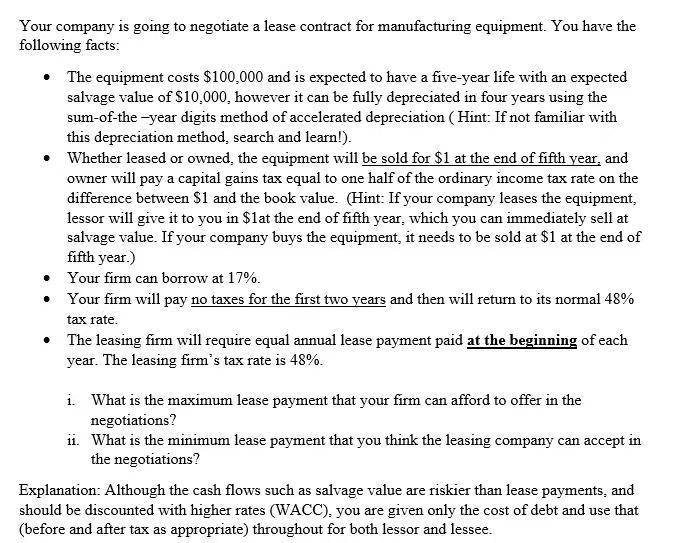
Your company is going to negotiate a lease contract for manufacturing equipment. You have the following facts: The equipment costs $100.000 and is expected to have a five-year life with an expected salvage value of $10,000, however it can be fully depreciated in four years using the sum-of-the-year digits method of accelerated depreciation (Hint: If not familiar with this depreciation method, search and learn!). Whether leased or owned, the equipment will be sold for $1 at the end of fifth year, and owner will pay a capital gains tax equal to one half of the ordinary income tax rate on the difference between $1 and the book value. (Hint: If your company leases the equipment, lessor will give it to you in $lat the end of fifth year, which you can immediately sell at salvage value. If your company buys the equipment, it needs to be sold at $1 at the end of fifth year.) Your firm can borrow at 17%. Your firm will pay no taxes for the first two years and then will return to its normal 48% tax rate. The leasing firm will require equal annual lease payment paid at the beginning of each year. The leasing firm's tax rate is 48%. i. What is the maximum lease payment that your firm can afford to offer in the negotiations? ii. What is the minimum lease payment that you think the leasing company can accept in the negotiations? Explanation: Although the cash flows such as salvage value are riskier than lease payments, and should be discounted with higher rates (WACC), you are given only the cost of debt and use that (before and after tax as appropriate throughout for both lessor and lessee. Your company is going to negotiate a lease contract for manufacturing equipment. You have the following facts: The equipment costs $100.000 and is expected to have a five-year life with an expected salvage value of $10,000, however it can be fully depreciated in four years using the sum-of-the-year digits method of accelerated depreciation (Hint: If not familiar with this depreciation method, search and learn!). Whether leased or owned, the equipment will be sold for $1 at the end of fifth year, and owner will pay a capital gains tax equal to one half of the ordinary income tax rate on the difference between $1 and the book value. (Hint: If your company leases the equipment, lessor will give it to you in $lat the end of fifth year, which you can immediately sell at salvage value. If your company buys the equipment, it needs to be sold at $1 at the end of fifth year.) Your firm can borrow at 17%. Your firm will pay no taxes for the first two years and then will return to its normal 48% tax rate. The leasing firm will require equal annual lease payment paid at the beginning of each year. The leasing firm's tax rate is 48%. i. What is the maximum lease payment that your firm can afford to offer in the negotiations? ii. What is the minimum lease payment that you think the leasing company can accept in the negotiations? Explanation: Although the cash flows such as salvage value are riskier than lease payments, and should be discounted with higher rates (WACC), you are given only the cost of debt and use that (before and after tax as appropriate throughout for both lessor and lessee







